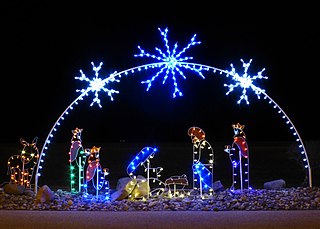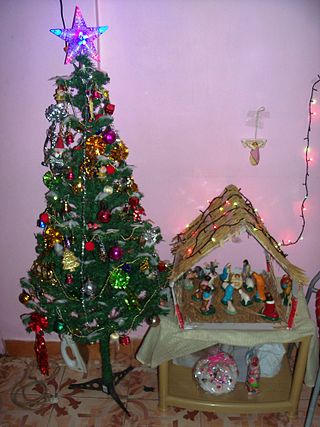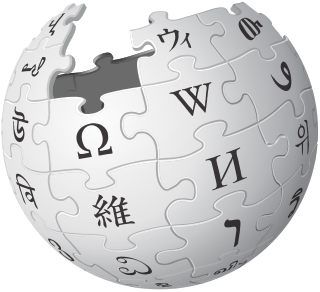Related Research Articles

Alan Alexander Milne was an English writer best known for his books about the teddy bear Winnie-the-Pooh, as well as for children's poetry. Milne was primarily a playwright before the huge success of Winnie-the-Pooh overshadowed all his previous work. Milne served in both world wars, as a lieutenant in the Royal Warwickshire Regiment in the First World War and as a captain in the Home Guard in the Second World War.

Christmas is an annual festival commemorating the birth of Jesus Christ, observed primarily on December 25 as a religious and cultural celebration among billions of people around the world. A feast central to the liturgical year in Christianity, it follows the season of Advent or the Nativity Fast, and initiates the season of Christmastide, which historically in the West lasts twelve days and culminates on Twelfth Night. Christmas Day is a public holiday in many countries, is celebrated religiously by a majority of Christians, as well as culturally by many non-Christians, and forms an integral part of the holiday season surrounding it.
The Deseret alphabet is a phonemic English-language spelling reform developed between 1847 and 1854 by the board of regents of the University of Deseret under the leadership of Brigham Young, the second president of the Church of Jesus Christ of Latter-day Saints. George D. Watt is reported to have been the most actively involved in the development of the script's novel characters, which were used to replace those of Isaac Pitman's English phonotypic alphabet. He was also the "New Alphabet's" first serious user. The script gets its name from the word deseret, a hapax legomenon in the Book of Mormon, which is said to mean "honeybee" in the only verse it is used in.

Viz is a British adult comic magazine founded in 1979 by Chris Donald. It parodies British comics of the post-war period, notably The Beano and The Dandy, but with extensive profanity, toilet humour, black comedy, surreal humour and generally sexual or violent storylines. It also sends up tabloid newspapers, with mockeries of articles and letters pages. It features parody competitions and advertisements for overpriced 'limited edition' tat, as well as obsessions with half-forgotten kitsch celebrities from the 1960s to the 1980s, such as Shakin' Stevens and Rodney Bewes. Occasionally, it satirises current affairs and politicians, but it has no particular political standpoint.

Mornington Crescent is an improvisational comedy game featured in the BBC Radio 4 comedy panel show I'm Sorry I Haven't a Clue (ISIHAC), a series that satirises panel games.

Postal codes used in the United Kingdom, British Overseas Territories and Crown dependencies are known as postcodes. They are alphanumeric and were adopted nationally between 11 October 1959 and 1974, having been devised by the General Post Office. A full postcode is known as a "postcode unit" and designates an area with several addresses or a single major delivery point.

Countdown is a British game show involving word and mathematical tasks that began airing in November 1982. It is broadcast on Channel 4 and is currently presented by Colin Murray, assisted by Rachel Riley with lexicographer Susie Dent. It was the first programme to be broadcast on Channel 4 and 89 series have been broadcast since its debut on 2 November 1982. With over 8,000 episodes, Countdown is one of Britain's longest-running game shows; the original French version, Des chiffres et des lettres, has been running on French television continuously since 1965. Countdown was produced by Yorkshire Television and was recorded at The Leeds Studios for 27 years, before moving to the Manchester-based Granada Studios in 2009. Following the development of MediaCityUK, Countdown moved again in 2013 to the new purpose-built studios at Dock10 in Greater Manchester.

A Christmas card is a greeting card sent as part of the traditional celebration of Christmas in order to convey between people a range of sentiments related to Christmastide and the holiday season. Christmas cards are usually exchanged during the weeks preceding Christmas Day by many people in Western society and in Asia. The traditional greeting reads "wishing you a Merry Christmas and a Happy New Year". There are innumerable variations on this greeting, many cards expressing more religious sentiment, or containing a poem, prayer, Christmas song lyrics or Biblical verse; others focus on the general holiday season with an all-inclusive "Season's greetings". The first modern Christmas card was by John Calcott Horsley.

An acrostic is a poem or other word composition in which the first letter of each new line spells out a word, message or the alphabet. The term comes from the French acrostiche from post-classical Latin acrostichis, from Koine Greek ἀκροστιχίς, from Ancient Greek ἄκρος "highest, topmost" and στίχος "verse". As a form of constrained writing, an acrostic can be used as a mnemonic device to aid memory retrieval. When the last letter of each new line forms a word it is called a telestich; the combination of an acrostic and a telestich in the same composition is called a double acrostic.

The News Quiz is a British topical panel game broadcast on BBC Radio 4, first broadcast in 1977. The show, created by John Lloyd from an idea by Nicholas Parsons, has seen several hosts, including Barry Norman, Barry Took, Simon Hoggart, Sandi Toksvig, and Miles Jupp. Andy Zaltzman was announced as the permanent host after series 103. The show involves four panellists, often comedians or journalists, who answer questions about events of the previous week, often leading to humorous and satirical exchanges. The show was adapted for television in 1981 and has also inspired other shows.

Simon David Hoggart was an English journalist and broadcaster. He wrote on politics for The Guardian, and on wine for The Spectator. Until 2006 he presented The News Quiz on BBC Radio 4. His journalism sketches have been published in a series of books.

Christmastide, also known as Christide, is a season of the liturgical year in most Christian churches.
Letters from Father Christmas, formerly known as The Father Christmas Letters, are a collection of letters written and illustrated by J. R. R. Tolkien between 1920 and 1943 for his children, from Father Christmas. They were released posthumously by the Tolkien estate on 2 September 1976, the 3rd anniversary of Tolkien's death. They were edited by Baillie Tolkien, second wife of his youngest son, Christopher. The book was warmly received by critics, and it has been suggested that elements of the stories inspired parts of Tolkien's The Lord of the Rings.

The observance of Christmas around the world varies by country. The day of Christmas, and in some cases the day before and the day after, are recognized by many national governments and cultures worldwide, including in areas where Christianity is a minority religion. In some non-Christian areas, periods of former colonial rule introduced the celebration ; in others, Christian minorities or foreign cultural influences have led populations to observe the holiday.

Jim'll Fix It is a British television series broadcast by the BBC, presented by Jimmy Savile and running for almost two decades, between May 1975 and July 1994. Devised by Bill Cotton, the show encouraged children to write a letter to Savile with a "wish" that would come true at the end of each episode, upon which the child would be granted a medal. Famous people who appeared on the show included Muhammad Ali, Doctor Who stars Tom Baker and Colin Baker, Rolf Harris, Gary Glitter, Margaret Thatcher and Peter Cushing.
Gawker was an American blog founded by Nick Denton and Elizabeth Spiers that was based in New York City and focused on celebrities and the media industry. According to SimilarWeb, the site had over 23 million visits per month as of 2015. Founded in 2002, Gawker was the flagship blog for Denton's Gawker Media. Gawker Media also managed other blogs such as Jezebel, io9, Deadspin and Kotaku.

Gawker Media LLC was an American online media company and blog network. It was founded by Nick Denton in October 2003 as Blogwire, and was based in New York City. Incorporated in the Cayman Islands, as of 2012, Gawker Media was the parent company for seven different weblogs and many subsites under them: Gawker.com, Deadspin, Lifehacker, Gizmodo, Kotaku, Jalopnik, and Jezebel. All Gawker articles are licensed on a Creative Commons attribution-noncommercial license. In 2004, the company renamed from Blogwire, Inc. to Gawker Media, Inc., and to Gawker Media LLC shortly after.

Santa Claus is a legendary figure originating in Western Christian culture who is said to bring gifts during the late evening and overnight hours on Christmas Eve. He is said to accomplish this with the aid of Christmas elves, who make the toys in his workshop, and with the aid of flying reindeer who pull his sleigh through the air.

Adrian Chen is an American blogger, and former staff writer at The New Yorker. Chen joined Gawker in November 2009 as a night shift editor, graduating from an internship position at Slate, and has written extensively on Internet culture, especially virtual communities such as 4chan and Reddit. Chen is the creator of The Pamphlette, a "humor publication" for Reed College students on a piece of letter-size paper. He has written for The New York Times, New York magazine, Wired, and other publications.

The logo of Wikipedia, a free online encyclopedia, is an unfinished puzzle globe—some jigsaw pieces are missing at the top—each inscribed with a glyph from a different writing system. As displayed on the web pages of the English-language edition of the project, there is the wordmark "WIKIPEDIA" under the globe, and below that, the text "The Free Encyclopedia" in the free Linux Libertine font, which is open-source.
References
- ↑ "Round Robins". Debrett's. Archived from the original on 10 January 2014.
- 1 2 "Why are round-robin letters so annoying?". BBC News. 22 December 2008. Retrieved 10 January 2014.
- ↑ Read, Max (27 January 2012). "Behold, the Most Obnoxious Christmas Letter Ever". Gawker. Gawker Media.
- ↑ Pritchett, Oliver (17 December 2012). "Three jeers for the round robin!". The Daily Telegraph. Retrieved 10 January 2014.